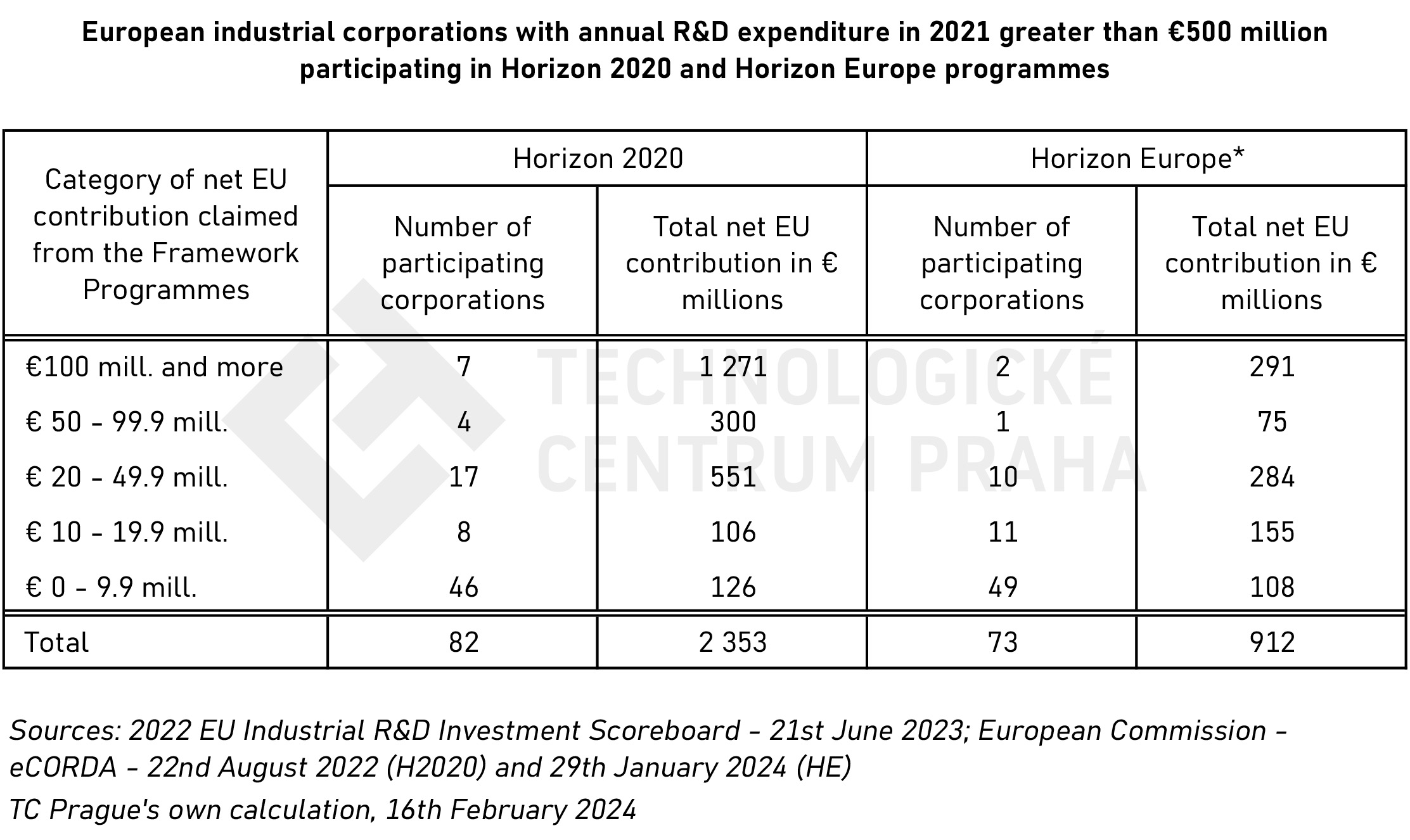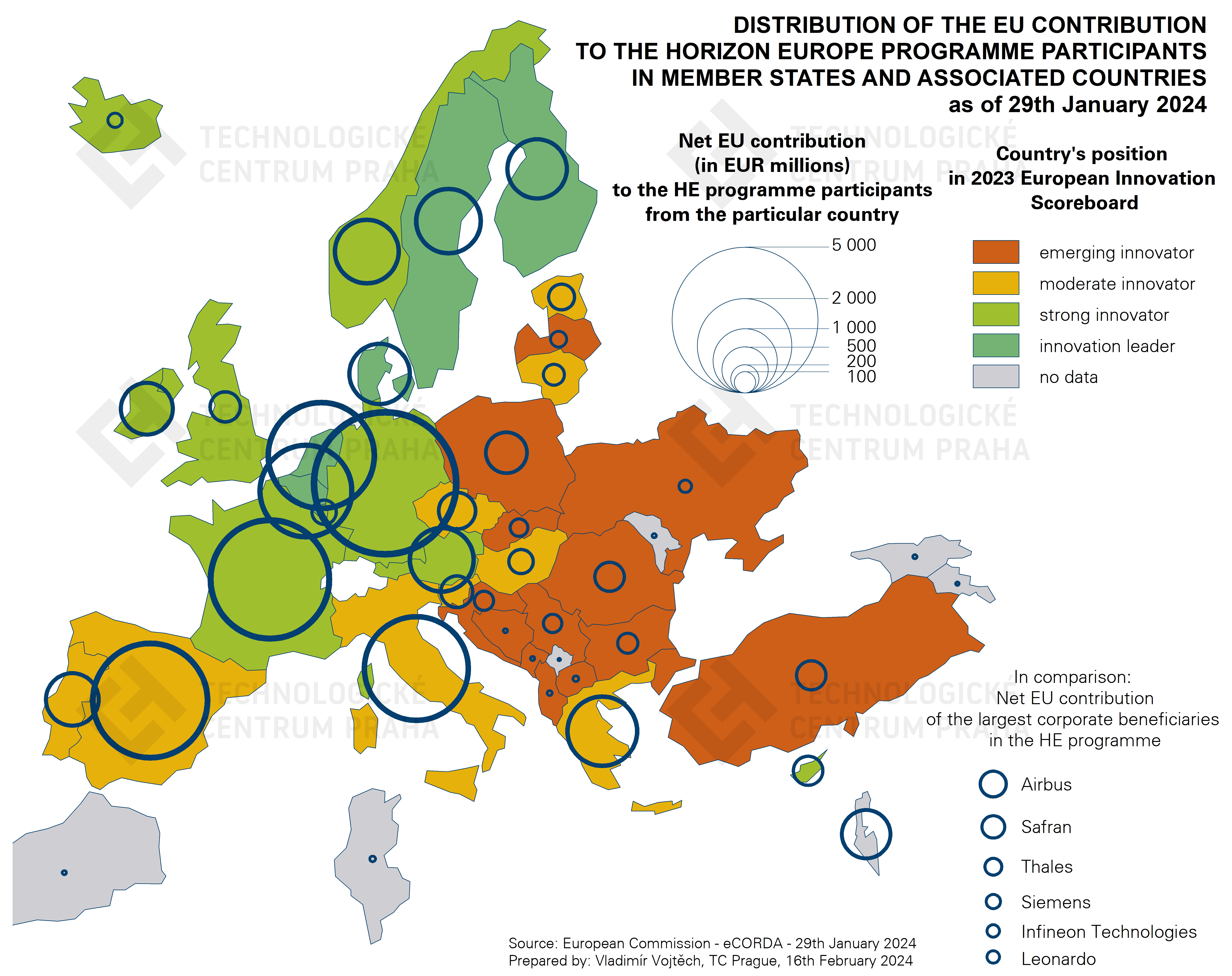Workshops for ERC applicants: Guidelines for the expression of interest
06/03/2025

The February 5, 2024, post presented the position of European industrial corporations among the top 100 global innovators as seen by leading R&D analytics provider Patsnap in 2023. Patsnap's ranking included 24 European corporations. TC Prague added information on (1) R&D spending in 2021 from the 2022 EU Industrial R&D Investment Scoreboard and (2) participation in the EU's research and innovation framework programmes. The main conclusions of this contribution were, inter alia, that
Compared to Patsnap's 2023 ranking, the EU Industrial R&D Investment Scoreboard has a richer publicly available data base working with data from the financial statements of the world's 2,500 largest industrial corporations, with 520 corporations from Europe for 2022 (359 from EU member states). As the Patsnap’s 2023 ranking only works with the 100 corporations that are at the forefront of global technological progress, it is clear, that many major European industrial corporations with high R&D expenditures are not listed (e.g. Mercedes-Benz, BMW, Airbus, Novo Nordisk, Thales, etc.). The 2022 EU Industrial R&D Investment Scoreboard database will thus allow us to clarify the findings presented in the previous post.
Annual R&D expenditure in 2021 of more than €500 million had 93 European corporations (including 72 corporations from the EU member states). 21 of these corporations were listed by Patsnap among the world's top 100 innovators in 2023. Of these 93 European industrial corporations, 13 had annual R&D expenditures of more than €5 billion and another 35 between €1 and €4.9 billion (see the attached table).
Among the 93 European industrial corporations with the highest annual R&D expenditure, corporations from Germany (23) and France (18) dominate. German corporations focus on the automotive (8 corporations - Volkswagen, Mercedes-Benz, BMW, Robert Bosch, Continental, ZF, Schaeffler, Mahle) and pharmaceutical and biotechnology industries (4 corporations - Bayer, Boehringer Sohn, Merck DE, Biontech). The French corporations focus on the automotive (4 corporations - Renault, Valeo, Faurecia, Michelin) and aerospace and defence (3 - Thales, Safran, Dassault Aviation). 11 corporations were reported by the United Kingdom and 10 each by the Netherlands and Switzerland.
Of the 93 European industrial corporations reported, 82 participated in the Horizon 2020 programme (H2020; 2014–2020), claiming a net EU contribution of €2.4 billion, i.e. 12% of the total net EU contribution claimed by companies in H2020. This amount corresponds to the net EU contribution claimed by all Swedish or Swiss participants in H2020. By comparison, the Czech Republic claimed a net EU contribution of € 0.5 billion in H2020, Poland € 0.75 billion. The net EU contribution to Airbus Group companies in the H2020 programme amounted to €353 million. In the Thales Group, €249 million was received from the H2020. The net EU contribution to Airbus Group is thus equivalent to the amounts claimed from H2020 by the Cypriot (€319m), Hungarian (€370m) or Slovenian participants (€379m). The Thales Group is then on a par with Estonia (€274m) or Turkey (€279m). Another 5 corporations reported a net EU contribution in H2020 of more than €100 million (Safran, Siemens, Leonardo, Infineon Technologies, STMicroelectronics), but only 2 (Safran, Siemens) were listed by Patsnap among the 100 global innovators in 2023. Together, these 7 corporations thus claimed a net EU contribution of €1.3 billion from H2020 (see table below).

As of 29 January 2024, 73 European industrial corporations with an annual R&D expenditure of more than €500 million in 2021 participated in the current Horizon Europe programme (HE). Together, these corporations claimed a net EU contribution of €912 million. This represents 10% of the total net EU contribution claimed by companies in HE. A similar amount was claimed in the HE programme by all Danish (€935 million) or Finnish participants (€910 million).
In HE, the highest net EU contribution was claimed by Airbus (€163 million), Safran (€128 million) and Thales (€75 million). These are similar to the amounts claimed by Estonia (€174m), Hungary (€150m) or Slovakia (€84m) – see map diagram below. For comparison, Czech participants claimed a net EU contribution of €361 million from HE on 29 January 2024.

The statements made in the previous post, that the amounts claimed by European corporations from the EU’s framework programmes represent only a small part of corporate R&D budgets, are also broadly true for the wider set of corporations assessed. The exceptions are European corporations operating mainly in the aerospace and defence sector (Safran, Thales, Airbus, Leonardo) - in their R&D budgets, framework programmes’ money play a more significant role. These corporations are among the largest corporate beneficiaries of framework programmes support.
Summary:
The 93 European industrial corporations with the largest R&D expenditures collectively claimed an amount from the EU’s Framework Programmes equivalent to that of Sweden, Finland or Denmark. In total, this corresponds to €2.4 billion in Horizon 2020 and about €1 billion in Horizon Europe. This is roughly 1/8 or 1/10 of the total amount claimed by enterprises in the Framework Programmes. Separately, the largest corporate beneficiaries (e.g. Airbus, Safran, Thales) claim EU contributions from the Framework Programmes at a similar level to some of the innovation/research underperforming countries. The amounts drawn by European corporations from FP budgets represent only a small proportion of corporate R&D expenditures (except for aerospace and defence corporations).
Author: Vladimír Vojtěch, vojtech@tc.cz, TC Prague, 20.02.2024
06/03/2025
10/03/2025
16/02/2025